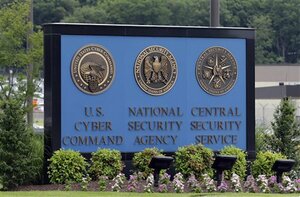NSA to destroy millions of Americans’ phone records
The agency’s bulk collection program garnered international attention after former NSA contractor Edward Snowden unveiled the intelligence gathering in 2013.

In this June 6, 2013, file photo, a sign stands outside the National Security Administration (NSA) campus on in Fort Meade, Md.
Patrick Semansky/AP
Privacy advocates, rejoice.
In what has become an ongoing struggle to maintain Americans’ privacy rights in national security measures, the National Security Agency (NSA) has agreed to destroy millions of Americans’ phone records collected under its contentious surveillance program, the Associated Press reports.
The Bush administration created the bulk collection program under Section 215 of the USA Patriot Act following the Sept. 11 attacks in 2001. But it garnered international attention after former NSA contractor Edward Snowden unveiled the large-scale intelligence gathering effort in 2013.
After Congress’s inaction let Section 215 expire on June 1, 2015, President Obama passed the USA Freedom Act the next day. Under this legislation, phone companies, rather than the federal government, will gather and store metadata – numbers dialed and the duration of phone calls – but not their content.
Intelligence officials can still access records relevant to a national security investigation, but will need a warrant from the Foreign Intelligence Surveillance Act (FISA) to do so.
The law gave the government six months to make the transition, but didn’t specify whether or not the NSA would still be able to access records it’s already collected. Though the program has been around for a decade, most of its records are purged every five years, so half of the collection has already been discarded, reports the Associated Press.
In a statement released Monday, the director of national intelligence said the NSA will no longer examine those records in terrorism investigations after Nov. 29, 2015. Because the agency is still undergoing lawsuits over the records, it’s legally obliged to preserve them until then. But once that date passes, they will be destroyed "as soon as possible," the statement reads.
Reforms to Section 215 of the Patriot Act drew bipartisan approval in Congress. Yet hardline privacy advocates such as Sen. Rand Paul (R) of Kentucky, said they could have done more to restore civil liberties, wrote The Christian Science Monitor’s Francine Kiefer in June.
On the other hand, Sen. Mitch McConnell (R) of Kentucky, said the USA Freedom Act “undermines American security by taking one more tool from our war fighters at exactly the wrong time.”
Most Americans agree that their privacy rights should trump national security concerns. According to a Pew Research Survey conducted in June 2014, 74 percent of those polled say Americans shouldn’t have to give up privacy and freedom in order to be safe from terrorism, while just 23 percent argue the opposite.
But opinion is more divided when asked specifically about the NSA’s data collection program. Fifty-four percent of Americans disapprove of the government’s collection of telephone and Internet data as part of anti-terrorism efforts, while 42 percent approve of the program.
Yet among privacy advocates, surveillance is a common enemy that cuts across political ideologies and party lines, Josh Withrow, legislative affairs manager for FreedomWorks, told the Monitor.
According to the same Pew Research study, nearly 70 percent of surveyors identified as steadfast conservatives oppose the government’s data collection program, as do 61 percent of business conservatives and 58 percent of solid liberals.
“Regardless of what you think about social welfare, spending policy, and the national debt, everybody is affected pretty much the same way when the government starts collecting records and surveilling you and violating that essential right to privacy that I think most Americans agree is a natural and constitutional right,” Mr. Withrow said.

